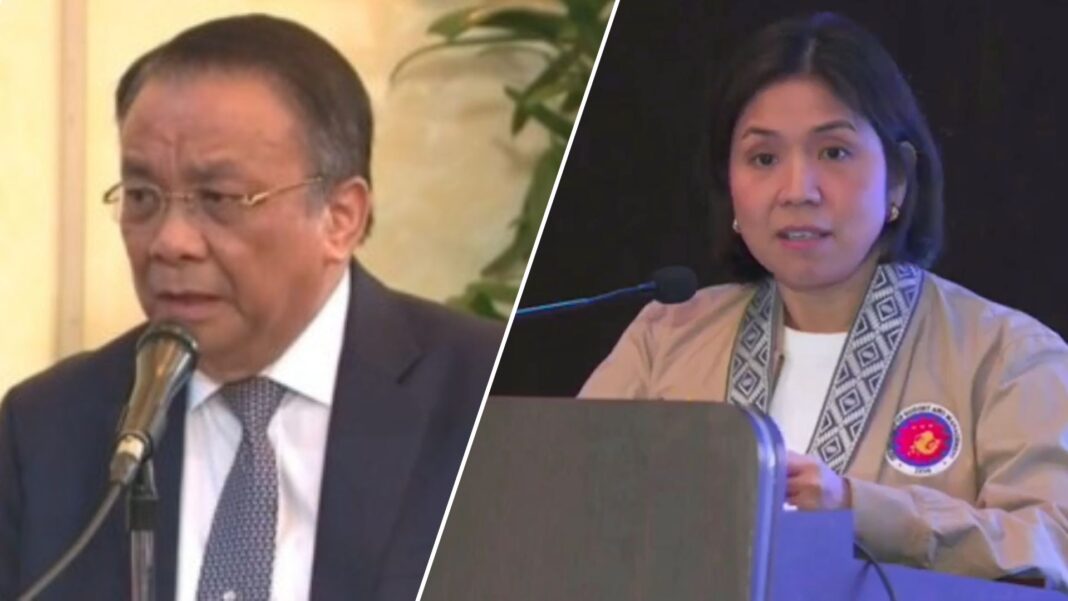The Palace framed the sudden resignations of Executive Secretary Lucas Bersamin and Budget Secretary Amenah Pangandaman as gestures of delicadeza: voluntary acts meant to allow ongoing investigations into alleged corruption in flood control projects to proceed without interference. But the political context surrounding the shake-up points to something larger and more urgent. These resignations were not simply expressions of personal propriety. They were strategic moves made at a moment when the administration was under intensifying political pressure from both inside and outside government.
Bersamin’s departure, though dramatic, had been preceded by months of speculation. As Executive Secretary, he occupied a role often described as second only to the President, and whispers about his future had surfaced repeatedly. He survived the courtesy resignation purge after the midterm elections. He outlasted other controversies that had briefly put him in the spotlight. Yet this latest storm proved different.
Pangandaman’s resignation, however, became the more telling indicator of the administration’s internal state. She was widely regarded as one of the most capable members of the economic team, precise, disciplined, and largely insulated from partisan battles. Her departure was not because she was personally involved in corruption allegations, but because she was directly mentioned by former appropriations chair Zaldy Co in his explosive claim that the President ordered ₱100 billion worth of insertions into the national budget. Co insisted that he communicated with Pangandaman regarding the supposed instructions, placing her and the entire DBM in the center of an unfolding political crisis.
These allegations did not emerge in isolation. They followed an earlier sworn statement by former Public Works undersecretary Roberto Bernardo, who claimed that a “15% agreed commitment” from questionable flood control projects was intended for the Office of the Executive Secretary. Bersamin denied the claim. Still, the allegation lingered long enough to create doubts and trigger scrutiny.
Co’s subsequent revelations transformed the situation. When a sitting senator and administration ally publicly alleged presidential involvement in questionable budget decisions and claimed confirmation from Palace and DBM officials, the crisis shifted from a bureaucratic concern into a political emergency. The administration could no longer rely on silence or denial. It required visible action.
This is where delicadeza intersects with damage control. The resignations provided the Palace with an opportunity to demonstrate accountability at a moment when its credibility was faltering. Removing the executive secretary and the budget secretary, even if both denied wrongdoing, signaled to the public, the Senate, and the business community that the administration understood the gravity of the situation. It also allowed the President to distance himself from the controversy at a time when his own name was being directly invoked.
The choice of replacements reinforces this interpretation. The appointment of Ralph Recto as Executive Secretary reflects a shift toward technocratic stability. Recto brings political experience, economic insight, and a reputation for competence — qualities urgently needed as the administration navigates slowing economic growth and public dissatisfaction. Frederick Go’s elevation to Finance Secretary and Budget Undersecretary Rolando Toledo’s designation as OIC at the DBM further indicate the administration’s desire to stabilize the economic cluster while containing political fallout.
For Bersamin, the resignation ends a tenure marked by influence and frequent speculation about his future. For Pangandaman, whose reputation as a technocrat had been a pillar of the economic team, the resignation interrupts a trajectory of service that many believed would continue for years. Both exits, though framed as voluntary, reveal the depth of the pressure facing the administration.
The broader question now is whether these resignations will actually calm the storm. The Senate’s investigations will continue. Public and investor concerns will not disappear overnight. The controversy involving Zaldy Co has not yet reached its full conclusion, and additional disclosures may still emerge. The administration has shown its willingness to sacrifice top officials to regain control of the narrative, but whether this will be enough to prevent further political damage remains uncertain.
In moments of crisis, governments often rely on symbolic actions to regain momentum. The departure of Bersamin and Pangandaman is one such moment — a mix of delicadeza, political necessity, and strategic damage control. It marks a turning point for the administration, revealing not only the scale of the controversy it now faces but also the lengths it must go to contain it. The next steps will determine whether this shake-up was a temporary maneuver or the beginning of a deeper realignment inside the Marcos presidency.


